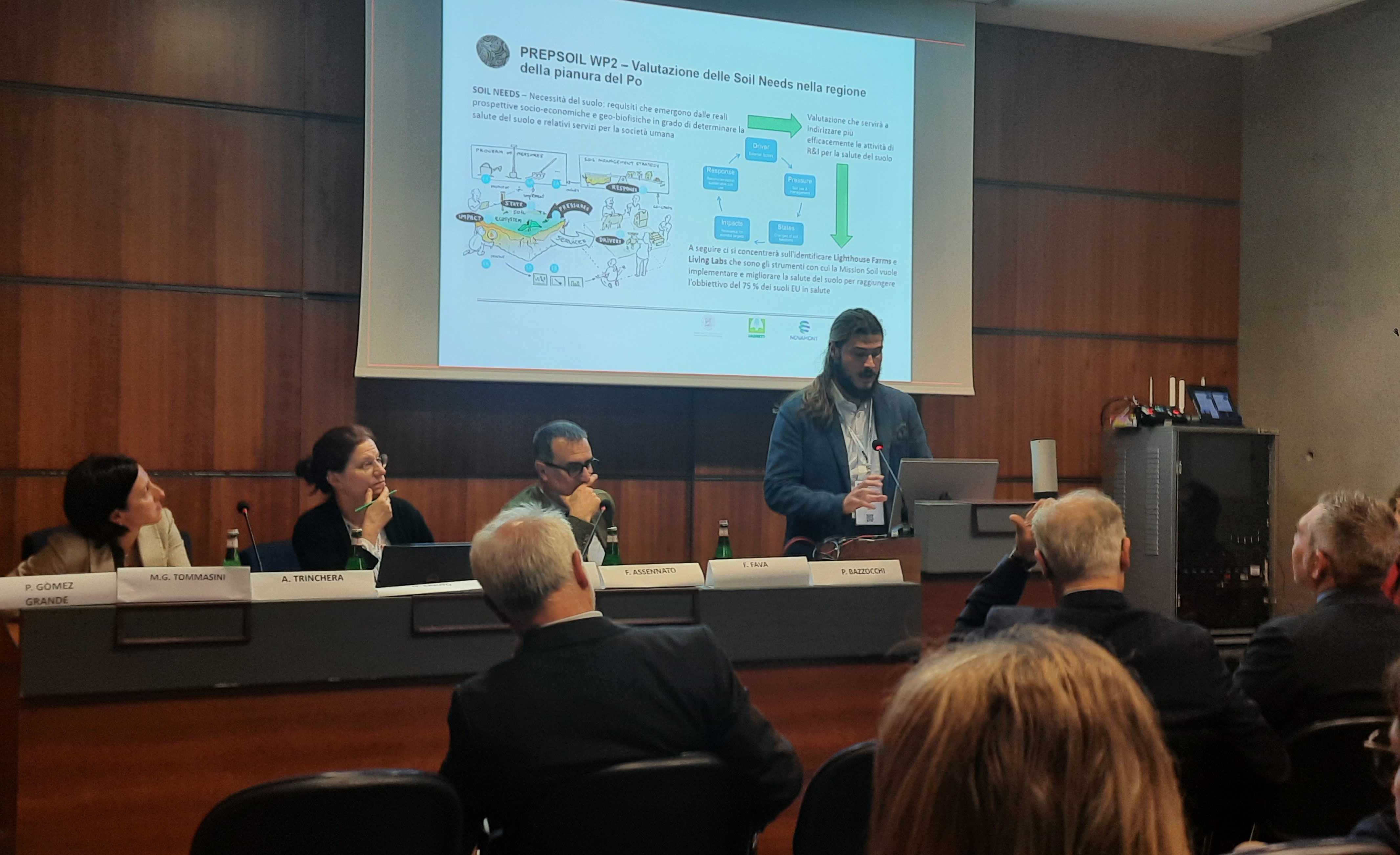Preparing the Soil for the Future: The European Projects PREPSOIL, EXCALIBUR and the Representative Region of the Po Plain

The Agricultural Land in Po Valley – Rimini (Italy) workshop has been promoted by Re Soil Foundation among the activities of the European project PREPSOIL (101070045 — PREPSOIL — HORIZON-MISS-2021-SOIL-01).
The event was taken together with the participation and presentation of another European project: EXCALIBUR (817946 – EXCALIBUR – H2020-SFS-2018-2020).
The event was carried out in the context of PREPSOIL’s work package 2, which aims to assess the soil needs emerging in the 21 representative regions across the EU territories, and was organised by Re Soil Foundation at MACFRUT, an important Italian fair regarding the agricultural sector that experience the participation of a great number of relevant stakeholders every year.
Re Soil Foundation is one of the 19 partners of PREPSOIL and was born with the purpose of pushing toward a real change starting from soil protection and the key principle of land regeneration, thanks to the cooperation of its founding members: University of Bologna, Politecnico of Torino, Novamont and Coldiretti (one of the biggest Italian farmers associations).
This workshop gathered stakeholders active in the regional area, on different levels: policy makers, research institutes (public and private), universities, representatives from the administrative sector, companies of the agricultural sector, farmers and producers.
The activities had begun with a catering where the various participants could engage among each other, then during the intervention the stakeholders had held each a presentation and were asked questions related to soil management, needs and barriers in the regional circumscription.
The workshop was divided into three sessions: in the first one was given space to the institutional stakeholders, in the second one was presented the project EXCALIBUR and in the third one the floor was given to farmers, producers and actors directly working on the field.
After a brief introduction to the event, the institutional session was opened: Pablo Gómez Grande (CSIC) explained the PREPSOIL project, Maria Grazia Tommasini (RI.NOVA) spoke about EXCALIBUR and Pietro Bazzocchi (Re Soil Foundation) presented the preliminary study conducted on the area (one of the 21 European representative regions is the Italian region Emilia-Romagna’s plain, where part of the Po river basin is located). Then the floor was given to Fabio Fava (University of Bologna), member of the national delegation for the mission “A soil deal for Europe”, who explained it more in detail. The next stakeholder to speak was Alessandra Trinchera from CREA, in relation to the role of plant biostimulants and the EU fertilizers regulation. Finally, were discussed the soil-related policies active on the territory on the different levels and temporal scales by Silvia Vanino (SOIL HUB, CREA), Francesca Assennato (ISPRA) and Giampaolo Sarno (Regione Emilia-Romagna).
During the second session, the project EXCALIBUR was further discussed. Thereafter was opened the third session were study cases and best practices for soil management held a central role in the topics. In particular, Andrea Ferrarini (Università Cattolica del Sacro Cuore of Piacenza) introduced “Tomato-C” where industrial tomato cultivation meets carbon farming, and described the operative protocols that are currently under evaluation; Maria Teresa Pacchioli (CRPA) spoke about the interactions among animal breeding and productions and the soil management, very significant theme in the soil needs panorama of the Po plain representative region, and the role of forage cultivations, key crops both for zootechny, croplands and soil.
Then two farmers (Filippo Pallara from Azienda Agricola Pallara and Valentino Chiarini from Agribologna) shared their management practices and interactions with the soil system: the first farm is located in a Nitrates-vulnerable area, whereas the second one is specialized in the use of green manures.
Throughout the numerous interventions, the stakeholders had been asked to point out (i) the three more urgent obstacles/challenges they see in the roadmap toward achieving the soil mission’s goals; (ii) the main problem the soil they act on is facing at this moment.
What emerged from the interventions and the discussions is that exists the need to valorise the economic value of soil quality: the carbon credits market regulation, along with the bioeconomy system growth, constitutes an opportunity. However, with regard to carbon stocks and the carbon credits, it has been highlighted that the carbon must be stable and the definitions clearer, in order to turn these solutions effective. The soil’s role and knowledge must be brought closer to the citizens’ eyes and awareness, already from the primary school: in general, it is needed that the knowledge about its societal value and the actual solutions and technologies are spread on every level, with special attention toward farmers. The excessive sectoral specialisation and fragmentation can constitute a barrier to the development: in the same way the soil system has to be looked at as a whole, solutions for its health need to be searched as a system. At this time, a soil law is necessary: it is a first and difficult step that has to be taken, and eventually corrected once it has been done.
The farmers have pointed out that the costs of technologies are often a barrier to their use (and must be compared also to the opportunity costs of other solutions). To reach out the farmers more efficiently and rapidly, the Living Labs, knowledge transfer and co-creation need to be addressed. Finally, the problem which zootechny represents has to be faced considering also the protection of stable forage cultivations and meadows (and its link with urbanisation and soil consumption).
